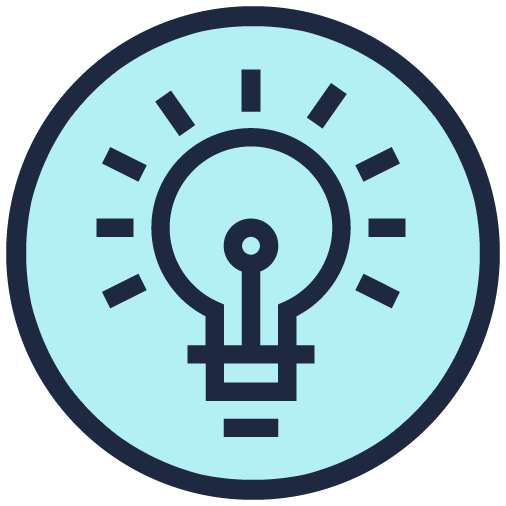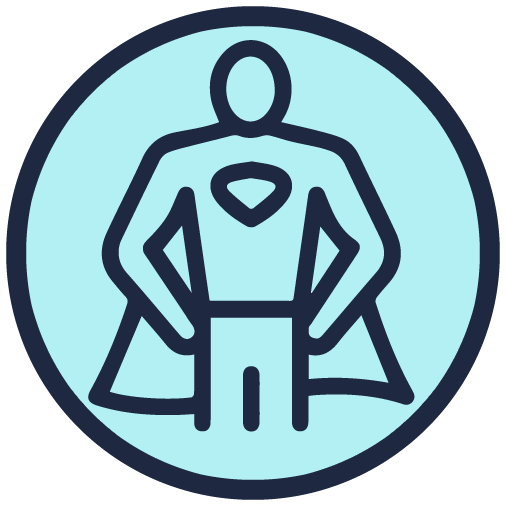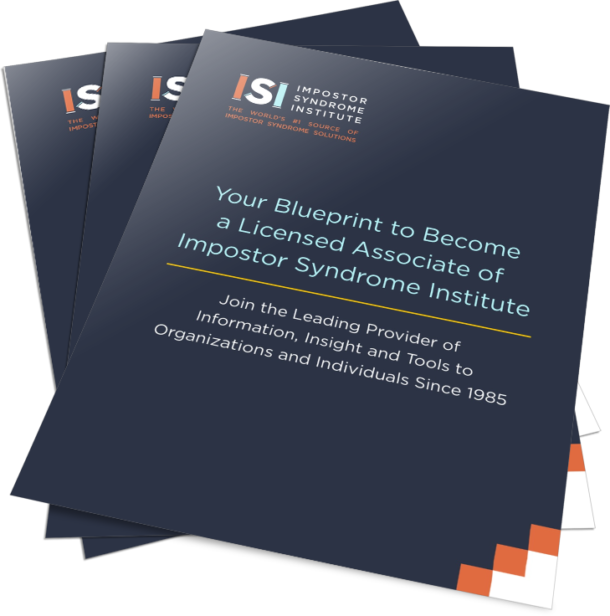Rethinking Impostor Syndrome™
Rethinking Impostor Syndrome™ is the name of our proven educational solution. Developed by Dr. Valerie Young, it has been delivered to over half a million people around the world since 1982.
It’s called a solution because it’s flexible enough to be delivered as a one-hour presentation and/or a longer interactive workshop, shared through a coaching protocol — or licensed as an in-house program delivered by your own team of facilitators.
The Rethinking Impostor Syndrome™ approach is:
AWARE. Rooted in a strong diversity and inclusion perspective that goes beyond gender or race
ACTIONABLE. Offers practical, immediately usable tools for individuals and organizations
FAR-REACHING. Caters to a wide range of audiences, industries, sectors, genders and professions
FLEXIBLE. Can be delivered on-site or virtual and expanded or contracted to suit your needs
ADAPTABLE. Easily integrates into existing programs and topics
As importantly, Rethinking Impostor Syndrome™ delivers a distinct point of view.
“Impostor syndrome has been over psychologized. We need to contextualize more and personalize less.”
“Everyone loses when bright people play small.”
“The only way to stop feeling like an impostor is to stop thinking like an impostor.”
The fact is, millions of men and women around the world — executives and entry-level professionals, first year college students and PhDs, artists and engineers — secretly worry they’re not as smart or talented or qualified as other people “think” they are.
And left unchecked, impostor syndrome can lead to costly consequences not only for individuals but for their organizations as well.
Rethinking Impostor Syndrome™ is the solution.
Audiences who attend this surprisingly upbeat program discover what impostor syndrome is, where it comes from (hint: it’s not all in your head), and how it works.
As importantly, you and your audience walk away with practical, immediately usable tools you can use to help yourself — and the people you lead, manage, mentor, teach, or parent — to finally feel as bright and capable as they really are.
CORE MESSAGES
THE NEED
Impostor syndrome isn’t just an “interesting self-help topic” — it’s a bottom line issue. Impostor-related thoughts and feelings lead to unproductive behaviours which are costly to individuals and their organization.
An estimated 70 percent of achievers — men and women — have experienced impostor syndrome. Discovering a name for these common feelings is the first step.
You’re
Not Alone
You’re
Not Alone
An estimated 70 percent of achievers – men and women – have experienced impostor syndrome. Discovering a name for these common feelings is the first step.
NORMALIZE
Impostor syndrome has been over-psychologized. In addition to family messages, there are situational, occupational, societal, and organizational sources of impostor feelings. Seeing our individual experience in a broader context helps to normalize and mitigate it.
A sense of belonging fosters confidence. Societal stereotypes about competence based on gender, race, age, language, class, and/or dis/ability make some groups especially susceptible to impostor syndrome.
Diversity
Matters
Diversity
Matters
A sense of belonging fosters confidence. Societal stereotypes about competence based on gender, race, age, language, class, and/or dis/ability make some groups especially susceptible to impostor syndrome.
REFRAME
FACT: Feelings are the last to change. The only way to stop feeling like an impostor is to stop thinking like an impostor. Fortunately this new thinking can be learned — and supported on an organizational level.
FROM “IMPOSTOR” TO HUMBLE REALIST™
People who don’t feel like impostors are no more intelligent, capable, or competent than those of us who do. They just think different thoughts.
This is not about a “pep talk.”
Simply telling yourself or others, “You’ve got this.” “You can do this!” Or “You deserve to be here!” (all of which are true) won’t move the needle in any lasting way.
That’s because people who are genuinely humble but have never had impostor feelings (we call them Humble Realists™), think differently about three things. Humble Realists™:
• hold themselves to realistic standards of competence
• have a healthy response to failure, mistakes, and constructive “criticism”
• expect to experience self-doubt and fear – but keep going regardless
VALERIE YOUNG’S FIVE TYPES OF IMPOSTOR Syndrome
People who feel like impostors hold themselves to unrealistic, unsustainable standards of competence. In Dr. Valerie Young’s research with hundreds of thousands of people from a wide range of occupations and at all phases of their careers, five different types emerged — each with its own unique focus:

THE PERFECTIONIST
- Primary focus on “how” something is done, how the work is conducted and how it turns out.
- One minor flaw in an otherwise stellar performance or 99 out of 100 equals failure, shame.

THE EXPERT
- The knowledge version of the Perfectionist, the primary concern is on “what” and “how much” you know or can do.
- Because you expect to know everything, even a minor lack of knowledge brings failure and shame.

THE NATURAL GENIUS
- The Natural Genius also cares about “how” and “when” accomplishments happen. But for you, competence is measured in terms of ease and speed.
- The fact that you have to struggle to master a subject or skill or that you’re not able to bang out your masterpiece on the first try equals failure which evokes shame.

THE SOLOIST
- Cares mostly about “who” completes the task.
- Because you think you should be able to do it all on your own, needing help, tutoring, or coaching is a sign of failure that evokes shame.

THE SUPERHUMAN
- The SuperHuman measures competence based on “how many” roles you can both juggle and excel in.
- Falling short in any role — as a parent, partner, on the home-front, friend, volunteer — all evoke shame because you feel you should be able to handle it all — perfectly and easily.
ORIGINS
Rethinking Impostor Syndrome™ was created by Valerie Young, Ed.D. and has been conducted in different iterations since 1982.
The core tenets of the program continue to be based on her doctoral work in the field of education where she examined women’s self-limiting attitudes and behaviors and their internal and external sources.
Her research subjects consisted of a highly racially diverse group of professional women. However, much of Valerie’s original findings have proved directly applicable to anyone with impostor feelings.
Rethinking Impostor Syndrome™ also draws from:
existing research on impostor syndrome, stereotype threat, and other related topics
observations from Valerie’s own professional and management experience gained from seven years in a Fortune 200 company and 25 years as an entrepreneur working with aspiring self-bossers
the collective experience and wisdom of hundreds of thousands of workshop participants in a wide cross section of careers, industries and life stages
Rethinking Impostor Syndrome™ offers a solution built and tested over more than four decades. One that saves you or your organization the time, effort, and money it would require to create such a comprehensive presentation, workshop or coaching protocol on your own.
SOLUTIONS THAT WORK
Taking impostor feelings out of the realm of therapy and into an educational arena has proven tremendously successful. To date, more than half a million people on four continents have attended this program.
Rethinking Impostor Syndrome™ works because it teaches people with impostor syndrome to “think different.”
Simply giving people an alternative way of thinking about themselves and their competence, to develop a new, healthy response to failure, criticism, and fear — and addressing the familial, situational, social, occupational, and organization sources of impostor syndrome — has proven to yield amazing results.
Women reported asking for — and getting — raises
Corporate executives who had participated in the workshop while in college told of being so transformed that years later they brought it in-house to their employees
University deans and other educators committed to increasing diversity in STEM applied our solutions on an organizational level
Writers and artists who held back suddenly became prolific
PhD students enthusiastically reported the entire trajectory of their academic career had shifted
People who lacked the confidence to start or grow a business suddenly found the courage to go for it
Choose the Rethinking Impostor Syndrome™ solution that’s right for you or your organization:
KEYNOTE AND WORKSHOPS
If you lead, manage, mentor, train, or coach people you need to understand impostor syndrome, its associated costs and consequences — and demand immediately usable solutions.
SPEAKER LICENSE FOR PRESENTERS AND WORKSHOP LEADERS
As a part of our global community, you have the rare opportunity to learn directly from Dr. Valerie Young — and get extensive access to a vetted program developed over four decades — saving you the time, effort, and money it would require to create on your own.
Solutions for Teams/Organizations, Higher Education, and Associations
Impostor-related thoughts and feelings lead to unproductive behaviors which are costly to individuals, teams and organization.
The goal of in-house solutions is not to “fix” anyone. Rather it’s to provide the information, insight, and tools needed to effectively address normal impostor feelings. Importantly, these same tools can be applied at the employee, team and/or organizational level with our proven solutions.
Coach Training
Studies find there's a 70-84% chance your coaching clients experience impostor syndrome. That's why you want to be fully versed in a practical, proven solution to help them break through.
Learn about our Rethinking Impostor Syndrome™ Coach Training.

